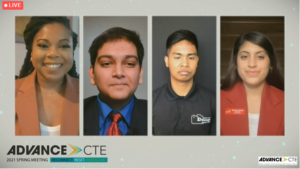This posts offers reflections from Advance CTE staff on key themes from Advance CTE’s 2021 Spring Meeting. Visit Advance CTE’s Resource Center for additional resources on elevating learner voice, strengthening career pathways and communicating with families and stakeholders.
Elevating Learner Voice in Shaping the Future of CTE
The future of Career Technical Education (CTE) is only a success when learner voices are truly centered as state CTE leaders develop new innovative strategies and equitable policies while implementing their state Perkins V plans under the new vision: Without Limits: A Shared Vision for the Future of Career Technical Education.
 Advance CTE’s 2021 Spring Meeting provided stakeholders of the CTE community the opportunity to hear directly from learners on their experiences navigating through the career preparation ecosystem and what they hope to see for the future of CTE.
Advance CTE’s 2021 Spring Meeting provided stakeholders of the CTE community the opportunity to hear directly from learners on their experiences navigating through the career preparation ecosystem and what they hope to see for the future of CTE.
Learners are engaged in a career preparation ecosystem when, “CTE provides opportunities for networking skills and connections to speak with industry partners and business professionals,” said Dianna Serrano, SkillsUSA National Region 4 Vice President.
Each learner has the supports and skills to succeed in the career preparation ecosystem when, “Work-based learning opportunities cultivate personal and professional networks,” said Rafael Bitanga, Director of Bitanga Productions, Member of Family Career and Community Leaders of America (FCCLA).
Each learner can access CTE without borders when, “Every school offers CTE pathways where learners are developing skills that continue to prepare them for future careers,” said Dhruv Agarwal, National Technology Student Association (TSA) Reporter.
Looking ahead, the future of CTE is bright, it is bold, it is equitable and it is learner-centered. Wherever learners are in their career journey, they feel welcomed and supported with the necessary tools to succeed.
Brittany Cannady, Senior Associate Digital Media
Elevating CTE in Federal Economic and Learning Recovery Policy
Just as the past year was unconventional in nearly every way, it was also an unconventional time for federal policy. For the better part of the year “business as usual” was put on hold and the Congressional and Administration focus was on COVID-19 (coronavirus) response and relief packages. During this year’s Spring Meeting it was evident that state CTE leaders had a greater connection than usual to federal actions because they are in the midst of implementation of pandemic stimulus bills, as well as implementation of the Strengthening Career and Technical Education for the 21st Century Act (Perkins V). This means there is a larger space for joint advocacy.
During the panel on 2021 Congressional Priorities, featuring the Democratic and Republican staff on the House Committee on Education and Labor and the Senate Committee on Health, Education, Labor and Pensions (HELP), each panelist encouraged meeting participants to contact their representatives in Congress to advocate for the CTE community. It was exciting to hear Congressional staff validate the power of each individual’s voice!
The presidential and Congressional elections in 2020 also provided a new opportunity to elevate CTE at the federal level. Not only was this brought up by the Congressional panelists, but also in the remarks provided by U.S. Secretary of Education Miguel Cardona. Secretary Cardona shared that as a proud CTE graduate he understands the value of CTE for each learner, especially during this time of economic recovery.
I am looking forward to continuing to bring state CTE leaders together with federal leaders so that we can advocate for high-quality and equitable CTE!
Meredith Hills, Senior Policy Associate
Reimagining CTE Program Design through the National Career Clusters® Framework

Without question, the 2021 Spring Meeting was very different from the first Advance CTE meeting I attended in the spring of 2008. What was not different was the valuable opportunity for state leaders of CTE to reconnect, reset and reimagine!
During the breakouts on the second day of the meeting, I was pleased to help host a reimagining conversation with state leaders centered on The National Career Clusters® Framework. State leaders concurred that the world of work continues to change rapidly and it is time to modernize The Framework’s structure and design to ensure its relevance for current and future needs of learners at all levels and of the workplace. One participant noted that students have skills that can cross into multiple industries, and asked, “How do we create fluidity between all of the areas?”
To that end, this effort is not designed to tinker around the edges, adding a new Career Cluster or renaming one of the existing Career Clusters. The work is seeking to completely reimagine the way The Framework is organized to reflect the current and future world of work. All that we are committed to at this stage is the purpose statement, which has been approved by the Advance CTE Board of Directors, which you can read on the project web page.
Advance CTE is seeking bold and innovative ideas to help us construct a new, modern and enduring Framework. To submit your ideas, visit the Advancing the Framework portal. Please also share this link through your networks to assist in our effort to crowdsource ideas that will shape a new framework.
Thank you for a great 2021 Spring Meeting!
Scott Stump, Senior Advisor
Reconnecting with Families on the Value of CTE
Achieving a robust national recovery will require a diverse and skilled workforce, not only through upskilling and reskilling displaced workers but also giving learners the tools to explore careers and prepare for lifelong skill building. While CTE has the tools to lead the way to fill this need, recruitment into CTE programs has stagnated for the past decade and significant awareness gaps remain, particularly among populations historically marginalized from participating in CTE.
Our 2021 Spring Meeting explored how to improve messaging about CTE to families to increase program recruitment and address equity gaps to ensure CTE can meet future workforce needs. Director of Communications and Membership Katie Fitzgerald and myself gave a preview of updated communications research on what parents/guardians and learners say is most important in their education, what messages and messenger resonate with them to consider and stay in CTE, and what message tailoring and program quality considerations should be taken to effectively reach populations historically marginalized from participation in CTE.
Members were excited to hear that many of the previously tested messages still resonate across racial, ethnic, and income categories, and that what families are looking for in their education closely aligns with what CTE can offer. Attendees were also very engaged in asking questions about equity gaps in satisfaction and messenger trust that were found in the research. We look forward to many more presentations to share this important information with stakeholders and utilizing tools to assist states in refreshing their communication plans to prioritize our key messages and equity considerations.
Stacy Whitehouse, Senior Associate Communications and State Engagement



 After years of anticipation, Congress has taken steps toward reauthorizing several pieces of legislation that impact CTE including the Carl D. Perkins Career and Technical Education Act, the Workforce Investment Act, the Elementary and Secondary Education Act, and the Higher Education Act. In addition to updates on these key pieces of legislation, we will discuss sequestration and debates over the FY14 budget.
After years of anticipation, Congress has taken steps toward reauthorizing several pieces of legislation that impact CTE including the Carl D. Perkins Career and Technical Education Act, the Workforce Investment Act, the Elementary and Secondary Education Act, and the Higher Education Act. In addition to updates on these key pieces of legislation, we will discuss sequestration and debates over the FY14 budget.